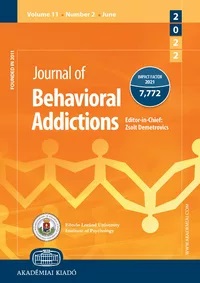The modulation of acute stress on model-free and model-based reinforcement learning in gambling disorder
The modulation of acute stress on model-free and model-based reinforcement learning in gambling disorder
Author(s): Florent Wyckmans, Nilosmita Banerjee, Mélanie Saeremans, Ross Otto, Charles Kornreich, Laetitia Vanderijst, Damien Gruson, Vincenzo Carbone, Antoine Bechara, Tony Buchanan, Xavier NoelSubject(s): Behaviorism
Published by: Akadémiai Kiadó
Keywords: gambling disorder; reinforcement learning; model-based; model-free; Two-Step Markov Task; stress
Summary/Abstract: Background and aims. Experiencing acute stress is common in behavioral addictions such as gambling disorder. Additionally, like most substance-induced addictions, aberrant decision-making wherein a reactive habit-induced response (conceptualized as a Model-free [MF] in reinforcement learning) suppresses a flexible goal-directed response (conceptualized as a Model-based [MB]) is also common in gambling disorder. In the current study we investigated the influence of acute stress on the balance between habitual response and the goal-directed system. Methods. A sample of N = 116 problem gamblers (PG) and healthy controls (HC) performed an acute stress task – the Socially Evaluated Cold pressure task (SECPT) – or a control task. Self-reported stress and salivary cortisol were collected as measures of acute stress. Following the SECPT, participants performed the Two-Step Markov Task to account for the relative contribution of MB and MF strategies. Additionally, verbal working memory and IQ measures were collected to account for their mediating effects on the orchestration between MB/MF and the impact of stress. Results. Both groups had comparable baseline and stress-induced cortisol response to the SECPT. Non-stressed PG displayed lower MB learning than HC. MANOVA and regression analyses showed a deleterious effect of stress-induced cortisol response on the orchestration between MB and MF learning in HC but not in PG. These effects remained when controlling for working memory and IQ. Discussion and Conclusions. We found an abnormal pattern of modulation of stress on the orchestration between MB and MF learning among PG. Several interpretations and future research directions are discussed.
Journal: Journal of Behavioral Addictions
- Issue Year: 11/2022
- Issue No: 3
- Page Range: 831-844
- Page Count: 14
- Language: English

